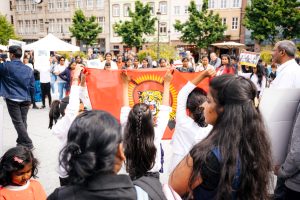Almost 15 years after the Sri Lankan civil war ended, there appears no end to the political divisions, not only between the Sinhalese majority and the Tamil minority but also among Tamil diaspora groups that have long demanded both justice and accountability for what many claim are serious war crimes committed by the Sri Lankan government.
The Joint Himalayan Declaration, the output of a dialogue between a Buddhist delegation and the Global Tamil Forum (GTF), the once-powerful Tamil umbrella organization that was blacklisted by the Sri Lankan government for allegedly funding terrorist activities, is the latest development to stir tension among the Tamil population.
Presented to Sri Lankan President Ranil Wickremesinghe, who promised to consider many of the measures outlined in the document, the Declaration is simple and covers six thematic areas: 1) promoting a pluralist society; 2) overcoming the economic crisis; 3) drafting a new constitution that guarantees individual and collective rights; 4) acceptance of religious and ethnic groups; 5) working toward reconciliation; and 6) compliance with bilateral and multilateral treaties.
However, the issues are highly controversial. The main areas of controversy are its lack of inclusion and what several groups have called a political maneuver that was “motivated to deceive Tamil people and the international community.”
The GTF has been accused of ignoring much of the Tamil community in seeking dialogue, which sparked as many as 70 civil society organizations to take to the streets in Sri Lanka’s Tamil-dominated Northeast, arguing that the Declaration was an “attempt to sustain the politics of tyranny.”
Looking closely at some of the major issues of contention, several of the Himalayan Declaration’s points leave plenty to be desired and much room for interpretation. First, a pluralist society can only be achieved in combination with several other factors, including not only a constitution that promotes equality among ethnicities, but also an electoral system that disrupts and restores balanced representation in Parliament. Currently Sinhalese political parties dominate in what is deemed an “ethnocracy,” where majoritarian rule is advanced and ethnonationalism drives political agendas.
Political analyst Neil DeVotta famously called Sri Lanka’s system a “control democracy,” where the majority group avoids compromises with other ethnicities and deliberately guards and controls the means of power, creating structural inequalities that are nearly impossible to overcome. Creating a truly equitable system will require compromise, but ethnonationalists will be hard-pressed to relinquish their advantages.
Reconciliation is also highly problematic, considering the island nation’s past two attempts. The Lessons Learned and Reconciliation Commission (LLRC), lacked sufficient independence and failed to address the volume of violations of human rights that the United Nations had called for. When Sri Lanka sponsored U.N. Human Rights Council Resolution 30/1 after considerable international pressure, it called for a number of reconciliation mechanisms, including a hybrid court system to try perpetrators of human rights violations and the Constitutional Task Force on Reconciliation Mechanisms (CTF), but the eventual output of the CTF went largely nowhere.
A statement released by six major diaspora groups said: “Knowing Ranil Wickremasinghe’s past of manipulating matters to his advantage, GTF’s meeting will provide [him] an opportunity to hoodwink the international community to sweep Tamils’ outcries under the carpet in the guise of success in talking with Tamil diaspora organizations and to promote support for the proposed Truth and Reconciliation Commission (TRC) model for the resolution internally.” The statement echoes the deep distrust between Tamil groups and the Sri Lankan government.
The timing of the Himalayan Declaration could not have been worse. It came amid the Sri Lankan government’s continuing crackdown on Tamils mourning their kin who were killed in the civil war. Tamils, including those in the diaspora, were marking Maaveerar Naal (Great Heroes Day or Martyrs’ Day) to honor the sacrifice of the Liberation Tigers of Tamil Eelam (LTTE) “martyrs.” The LTTE’s armed struggle to create an independent Tamil state was crushed by the Sri Lankan armed forces operating under the guise of anti-terrorism. This year, the Sri Lankan government arrested ten Tamils, including an 18-year-old boy, under the draconian Prevention of Terrorism Act for participating in Maaveerar Naal celebrations in the Tamil areas.
Repeating patterns that lead to distrust between the Sri Lankan government and Tamil groups have to be dismantled in favor of mechanisms and dialogue that are far more inclusive. Selective representation leads to greater fragmentation among Tamil diaspora groups, who are mostly united in seeking justice for the genocide committed by the Sinhalese state, but are divided on the tactics and means by which to accomplish these aims.
In this spirit, the Himalayan Declaration simply fueled distrust and gave legitimacy to suspicions about Wickremesinghe’s true motives.

































